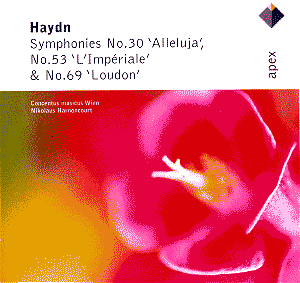No wonder Josef Haydnís
music is held in such high esteem. Here
was a man who could compose thematically
fresh and original symphonies written,
more often than not, as very high class
party music.
In this recording,
reissued from Teldecís long running
set of symphony recordings with Harnoncourt
and his Concentus musicus, we
get a most satisfying sampling of contrasts.
We open with the Symphony
no. 30, nicknamed "Alleluia"
because of its quote from the Easter
liturgy. Here we are treated to more
than just background music for the conversations,
meals and card games that would have
been happening as it was played. Haydn
cleverly disguises the liturgical quote
in inner voices until it is brought
to the fore toward the end of the opening
movement. Having gained the attention
of his audience, he then treats them
to a couple of delightful and delicate
solo passages from the flute and oboe.
He closes the work with a finale that
is far more subdued that one might expect.
One of his most successful
works in the genre, the fifty-third
symphony, was extremely popular and
copies of it were available all over
Europe. This was in spite of the fact
that the composerís princely patron
had rather lost interest in symphonies;
tired, in particular, of those harmonically
and formally challenging works of the
so-called Sturm und Drang period.
The work opens with a movement that
was not only somewhat long in duration
for its era, but also rich in chromatic
harmonies and irregular resolutions
of dissonance. The fourth movement presented
here is one of at least four possibilities,
as due to Prince Esterházyís
predilection for lighter music, Haydn
cribbed the last movement of his more
serious work for use in theatre pieces
and entertainment music.
Unlike others of his
"named" symphonies, Haydn
himself coined the nickname "Loudon"
for this work, after a very popular
military Field Marshal, Baron von Laudon,
or Loudon. Haydn scholars do not place
this symphony amongst the most outstanding
of his works, giving credence to the
belief that the music perhaps closely
reflected the tastes of its dedicatee,
thus limiting Haydnís adventuresome
bent.
In the early days of
the period performance movement, Harnoncourt
recordings were often used as my strongest
argument for the use of modern instruments.
More often than not I found them to
be screechy, thin and out of tune. Now
that there have been nearly forty years
of practice and refinement one cannot
help but find these performances expertly
rendered and completely satisfying.
Tempi have settled down into something
other than fast for fastís sake, and
the contrasts of color and articulation
have developed into something more uniform
and less purely "different"
from that of a modern symphony orchestra.
Intonation and ensemble are fine throughout,
and Harnoncourt has managed to capture
all the drama, humor and elegance with
which these scores are rife.
I am a bit surprised
to see these performances, first issued
throughout the 1990s at full price,
make an appearance at budget level so
soon. This is so much the better for
the consumer, however, as these are
first order renditions, well documented,
with excellent sound quality if perhaps
in only somewhat bland and generic packages.
There are a number
of other comparative choices, not the
least of which is the excellent traversal
on Naxos under Bela Drahos. But among
its other virtues, discs such as this
confound the long-standing belief that
good music must come at a high price.
A nice addition to any library, this
comes highly recommended.
Kevin Sutton


